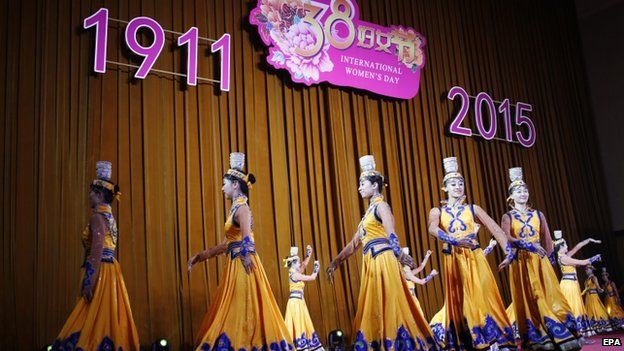China media: Domestic violence
- Published

Papers in China urge legislators to approve a law against domestic violence to ensure safety of women.
Lawmakers will review the first national law against domestic violence for approval during the ongoing annual parliamentary meetings in Beijing.
The new bill, drafted in November, defines domestic violence for the first time and offers clear guidance on restraining orders.
According to reports, nearly 40% of Chinese women who are married or in a relationship have suffered abuse.
'Hidden pain'
Despite the scale of the problem, domestic abuse has long been seen as a private matter in China, reports say.
The Xinhua News Agency urges authorities to speed up the implementation of anti-domestic violence laws to "eliminate society's hidden pain".
The news agency observes that some Chinese women continue to remain silent when faced with domestic violence, while law enforcers are usually oblivion to their plight.
Rong Hua, women's rights representative, tells the state media that such laws will better protect women and will also reflect the "improvement of the Chinese society and (judicial) system".
A commentary in the China Central Television points out that even if the law is passed, the authorities will still need to "strengthen the execution of the regulations" to "ingrain into everyone's mindset".
The South China Morning Post quotes activists as saying that the problem of domestic violence is "not taken seriously" in China and most victims are not aware of other options available for protection.
Prof Ke Qianting, a gender studies expert at Sun Yat-sen University, however, is confident that the draft law will have "a high chance of being passed by the National People's Congress in Beijing this month".
"In November, the Legislative Affairs Office of the State Council drafted the Anti-Domestic Violence Law and tendered it for public consultation, so we are very close now," the pundit tells the paper.
Punishing polluters
Meanwhile, some papers support President Xi Jinping's call for tougher actions to clean up the environment.
Mr Xi pledged on Friday that the government would severely punish polluters in the country, while urging the people to protect ecology and environment like they protect their "own eyes and life," the Xinhua News Agency reports.
"We are going to punish, with an iron hand, any violators who destroy ecology or environment, with no exceptions," the news agency quotes Mr Xi as saying.
The state media outlet also notes that environment pollution issue is a "hot topic" at the ongoing sessions of the top legislature and political advisory body.
A commentary in the People's Daily web portal highlights that the effort to clean up the environment is a "long fight" and people will have to "bear with it for a while".
"However, the leaders and the representatives did not evade the problem, instead they showed the courage to face it. This is enough to convince the people that the days of good environment are not too far away," says the article.
Echoing similar views, an article in the China Net urges lawmakers to "draw lessons" from other countries on managing the environment and "gradually establish regulations" to protect the people's rights to a better environment.
An opinion piece in the Haiwai Net warns against turning pollution issues into an "ideological problem" that will curb economic growth.
Li Daokui, a prominent Chinese economist, states in the article that environmental protection and economic development are "not conflicting". He suggests that the effort to improve the environment should also help create growth for China's economy.
"China is still a poor country, we cannot treat these two issues as conflicting problems," writes the pundit.
War history
And finally, papers urge Japanese leaders to reflect on the country's war crimes after Foreign Minister Wang Yi told Japan "not to lose its conscience".
"70 years ago, Japan lost the war - 70 years afterwards, it should not lose the conscience," Mr Wang said at a press conference on Sunday.
Noting that Japanese PM Shinzo Abe is likely to be invited to attend a military parade in China to mark the end of the Second World War, the China Daily suggests the leaders in Tokyo to "put themselves in the shoes of their Asian neighbours".
"It is a good opportunity for him and his cabinet to throw away the burden of the war by facing up to Japan's past," says the daily.
China and Japan are currently embroiled in a territorial dispute. Beijing also accuses Tokyo of glossing over its war actions.
BBC Monitoring reports and analyses news from TV, radio, web and print media around the world. You can follow BBC Monitoring on Twitter and Facebook.